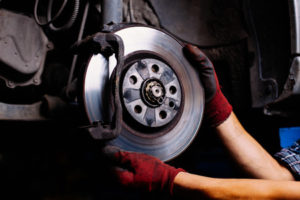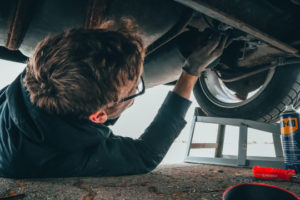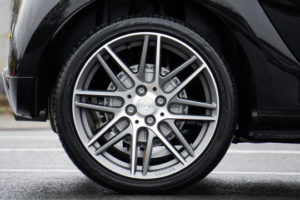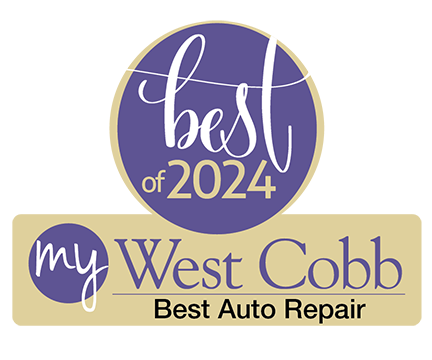It should go without saying that your brakes are the most important safety component on your car. Replacing brake pads and rotors is par for the course to ensure your vehicle stops when you want it to, but what’s this you’ve recently heard about a brake bleed or brake flush? Today, we talk about the differences between these maintenance items and which you need.
First, an overview of your brake system
 To understand why you might need a brake bleed or flush, you first need to have a basic understanding about how your brake system works.
To understand why you might need a brake bleed or flush, you first need to have a basic understanding about how your brake system works.
Your brakes work on a hydraulic system. When you press the brake pedal, the system transfers the pressure of your foot to your vehicle’s brakes. The lines that connect your brake pedal to the brakes themselves are filled with brake fluid. This fluid also keeps the hydraulic system lubricated and corrosion-free.
The lifespan of brake fluid varies from vehicle to vehicle, with some manufacturers recommending that you replace it every 3 years, others saying that it should be checked every 40 – 60,000 miles, and others yet saying that brake fluid will last the life of the vehicle. You’ll want to check your maintenance schedule to learn the exact recommendations for your car.
Regardless of interval, your brakes may be either bled or flushed at the time of service.
Does brake fluid need replacing between services?
For the most part, you shouldn’t need to touch your brakes between services. However, it’s still important to check your brake fluid as part of your maintenance schedule.
Ensuring that your vehicle has the right amount of brake fluid helps them work their best, so top off the reservoir if your levels are running low (just make sure to use the type recommended by the manufacturer in your owner’s manual).
What is the difference between a brake bleed and flush?
 Now that you know how your brake system works and how brake fluid is a part of it, what does a brake bleed or brake flush have to do with it?
Now that you know how your brake system works and how brake fluid is a part of it, what does a brake bleed or brake flush have to do with it?
Brake bleed
A brake bleed involves pumping new brake fluid into the system in order to eliminate air that might be in the lines. Air bubbles can decrease the braking power of your vehicle, so a bleed may be recommended if you’ve noticed that your brakes aren’t as effective as they used to be.
Brake flush
A brake flush involves draining all of the old fluid out of your brake lines and replacing it with new fluid. This service may be valuable if your brake fluid has gone bad.
How does brake fluid go bad?
Even though your brake fluid is designed to last several years, it’s possible for it to go bad. Brake fluid that has gone bad will reduce the effectiveness of your brakes, making it harder to stop.
Your brake fluid can go bad when:
- The fluid has absorbed moisture, which can cause corrosion and damage in the braking system
- The fluid has been contaminated with dirt and/or debris from components in the braking system
- The fluid starts breaking down due to frequent exposure to high heat, such as hard stops from high speeds
Which should you choose, a brake bleed or brake flush?
 A brake bleed is often all your vehicle needs to top off the fluids in your brake system and make sure that your brakes respond like they should when you press the pedal.
A brake bleed is often all your vehicle needs to top off the fluids in your brake system and make sure that your brakes respond like they should when you press the pedal.
Whether your vehicle needs a brake flush or not depends on the performance of your vehicle and the manufacturer’s recommendations. If your brakes are still working normally and your manual doesn’t recommend a brake flush, there is likely no need to get this service performed.
If you’ve noticed any change in the way brakes handle, it’s important to get your vehicle serviced.
Talk to your mechanic if:
- You’ve noticed problems with braking
- Your vehicle is needing longer and longer distances to stop
- You’ve noticed that your brake pedal feels squishy
- Your brake fluid looks dark or has particles/debris floating in it
Brake Repairs And More At T3 Atlanta
If you need a brake bleed or brake flush, want to keep your car on its maintenance schedule, or require more intensive repairs, T3 Atlanta can help. We provide fast and friendly service for Nissan, Infiniti, Lexus, and Toyota vehicles. Give us a call and we’ll pen you in for an appointment today!










Leave a Reply
You must be logged in to post a comment.